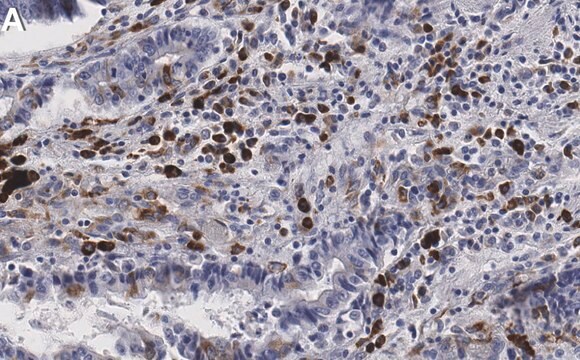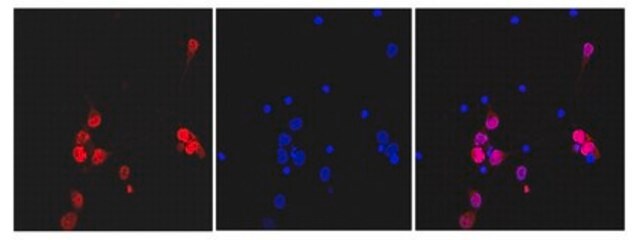ZRB1669
Anti-p-RPS6-Ser235/236 Antibody, clone 1I22 ZooMAb® Rabbit Monoclonal

recombinant, expressed in HEK 293 cells
Synonym(s):
40S ribosomal protein S6;Phosphoprotein NP33;Small ribosomal subunit protein eS6
About This Item
Recommended Products
biological source
rabbit
Quality Level
recombinant
expressed in HEK 293 cells
conjugate
unconjugated
antibody form
purified antibody
antibody product type
primary antibodies
clone
1I22, recombinant monoclonal
description
recombinant, expressed in HEK 293 cells
product line
ZooMAb® learn more
form
lyophilized
mol wt
calculated mol wt 28.68 kDa
observed mol wt ~33 kDa
purified by
using Protein A
species reactivity
human
species reactivity (predicted by homology)
bovine, sheep, mouse, rat, monkey
packaging
antibody small pack of 25 μL
greener alternative product characteristics
Waste Prevention
Designing Safer Chemicals
Design for Energy Efficiency
Learn more about the Principles of Green Chemistry.
enhanced validation
recombinant expression
Learn more about Antibody Enhanced Validation
sustainability
Greener Alternative Product
technique(s)
affinity binding assay: suitable
inhibition assay: suitable
western blot: suitable
isotype
IgG
epitope sequence
C-terminal
Protein ID accession no.
UniProt accession no.
greener alternative category
shipped in
ambient
storage temp.
2-8°C
target post-translational modification
phosphorylation (pSer235/pSer236)
Gene Information
human ... RPS6(6194)
General description
Specificity
Immunogen
Application
Evaluated by Western Blotting in lysate from HeLa cells treated with Calyculin A and Okadaic Acid.
Western Blotting Analysis (WB): A 1:1,000 dilution of this antibody detected phospho-S6 Ribosomal protein (RPS6)-Ser235/236 in lysate from HeLa cells overnight serum starved and treated with Calyculin A (50 nM) and Okadaic acid (500 nM) for 30 min.
Tested applications
Affinity Binding Assay: A representative lot of this antibody bound p-RPS6-Ser235/236 peptide with a KD of 8.7 x 10-6 in an affinity binding assay.
Peptide Inhibition Assay Analysis: : Target band detection in HeLa cell lysate was prevented by preblocking of a representative lot with the immunogen phosphopeptide, but not the corresponding non-phosphopeptide.
Note: Actual optimal working dilutions must be determined by end user as specimens, and experimental conditions may vary with the end user
Evaluated by Western Blotting in lysate from HeLa cells treated with Calyculin A and Okadaic Acid.
Western Blotting Analysis (WB): A 1:1,000 dilution of this antibody detected phospho-S6 Ribosomal protein (RPS6)-Ser235/236 in lysate from HeLa cells overnight serum starved and treated with Calyculin A (50 nM) and Okadaic acid (500 nM) for 30 min.
Target description
Physical form
Reconstitution
Storage and Stability
Legal Information
Disclaimer
Not finding the right product?
Try our Product Selector Tool.
Storage Class Code
11 - Combustible Solids
WGK
WGK 1
Flash Point(F)
Not applicable
Flash Point(C)
Not applicable
Choose from one of the most recent versions:
Certificates of Analysis (COA)
Don't see the Right Version?
If you require a particular version, you can look up a specific certificate by the Lot or Batch number.
Already Own This Product?
Find documentation for the products that you have recently purchased in the Document Library.
Our team of scientists has experience in all areas of research including Life Science, Material Science, Chemical Synthesis, Chromatography, Analytical and many others.
Contact Technical Service








